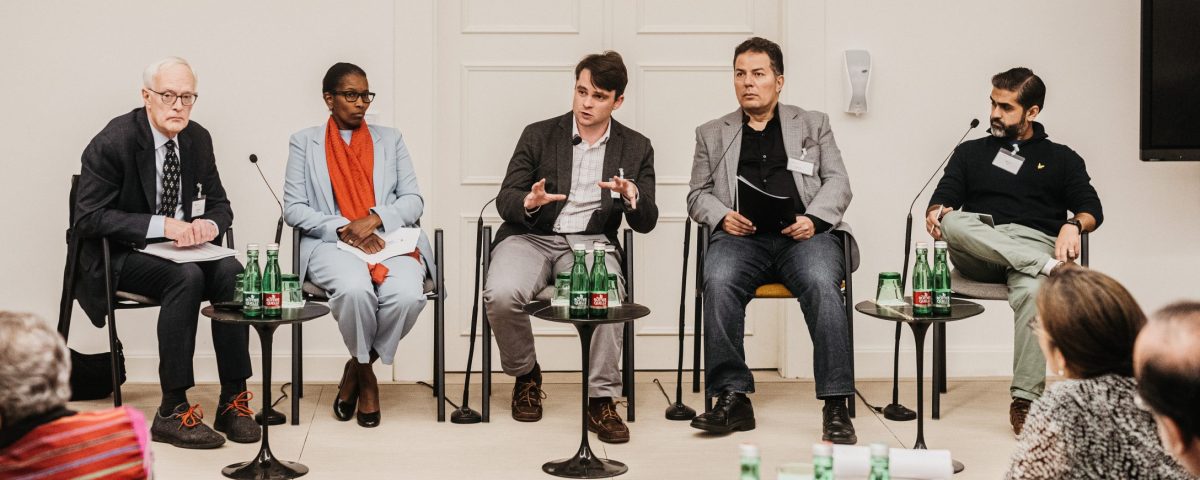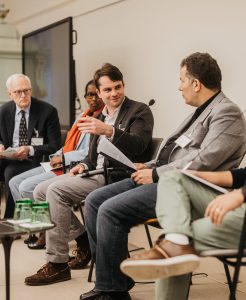Revealing the Struggle Against Islamist Influence: A Call to Action

Sam Westrop (in the middle), speaks at CLARITy Coalition conference panel “Understanding Islamist Strategies”, in 2022. Other participants included, from left, moderator and former AHA Board Chairman Chris Demuth, Ayaan Hirsi Ali, Hamed Abdel-Samad, and Wasiq Wasiq.
Published on 4/24/2024
*The opinions in this blog do not necessarily reflect the views of AHA Foundation*
Sam Westrop, Director of Middle East Forum’s Islamist Watch and founding member of CLARITy Coalition, outlines how Islamist Watch stands as a crucial tool, tracking millions of dollars allocated for Islamist causes and monitoring thousands of Islamist organizations across the Western world.
In this interview, he sheds light on the urgent need to counter Islamist extremism, the challenges faced in this endeavor, and the bold strategies necessary to confront this pervasive threat to Western societies.
AHA Foundation: What initially inspired you to found Islamist Watch, and what specific goals did you set out to achieve with this initiative?
Sam Westrop: Daniel Pipes, president of the Middle East Forum (MEF), established Islamist Watch as an MEF project in 2006. Plenty of groups focused on the jihadist threat, but not enough investigated the problem of lawful Islamism (otherwise known as non-violent Islamism) at that time.
“All across the polity, Islamists use the language and processes of liberalism and democracy to advance illiberal and anti-democratic ideals. Islamist Watch seeks to understand this problem and afford policymakers and journalists the means and expertise to address it.”
All across the polity, Islamists use the language and processes of liberalism and democracy to advance illiberal and anti-democratic ideals. Islamist Watch seeks to understand this problem and afford policymakers and journalists the means and expertise to address it.
Today, Islamist Watch tracks tens of millions of dollars of federal and state monies appropriated for lawful Islamist causes. We monitor over 4,000 Islamist organizations across the Western world. We track Islamist money in politics, Islamist candidates for public office, Islamist grant-making foundations, sharia finance institutions, and Islamist think tanks working to adapt Islamist ideologies to changing Western politics as well as fast-changing internal Islamist politics.
This is a complicated field, and Islamist Watch is just one of a handful of groups across the West working to understand competing Western Islamist forces, their extraordinary degrees of influence and astonishing ideological breadth.
“We have seen no real effort since October 7th by either political party to go after Islamist financing or to understand Islamist networks fully and the seriousness of the threat that they present. The reasons for this are varied.”
AHA Foundation: You were one of the 21 academics and activists who, along with AHA Foundation, founded the CLARITy Coalition with the aim of uniting their activism against the threat of Islamist extremism across the world. Has the ongoing conflict between Hamas and Israel raised the urgency of this work, especially in terms of increasing awareness about how Islamist extremism is funded and its consequences in the West?
Sam Westrop: This is a topic that my colleagues and I have repeatedly discussed over the past few months. My personal feeling is that the October 7th attacks and the resulting conflict since then have not brought the question of Islamism back to the forefront of policymakers’ minds, at least, not in the United States.
We have seen no real effort since October 7th by either political party to go after Islamist financing or to understand Islamist networks fully and the seriousness of the threat that they present. The reasons for this are varied.
One key point is that Hamas is still not understood by policymakers and journalists to be a product of Islamist ideology. Indeed, American Islamist organizations that are openly ideologically sympathetic to Hamas continue to receive federal funds, puff pieces written about them in major newspapers, and the endorsement and partnership of politicians, academics, activists, and clergy on all sides of the political and religious spectrums.
Meanwhile, the hundreds of other Islamist networks operating in the West, unconnected to Hamas, continue to receive absolutely no attention at all. The October 7th attacks changed very little.
In Europe, it is different. There is a loud and public conversation about Islamism, because the threat is much more visible in the suburbs of major French cities, or entire towns in Northern England. The threat in much of Western Europe, both ideological and physical, is so vividly apparent and frightening now that the government and media finds itself forced to address the problem. These conversations would be taking place whether October 7th happened or not.
“The initial failure in Europe, and the continued failure in the United States, occurred for several reasons. First, Islamists themselves have worked very hard to obfuscate the distinction between Islam and Islamism. Indeed, it’s one of the key beliefs that Islamists have in common with anti-Muslim activists. And too many policymakers have tended to listen to one or the other; but not to counter-Islamist activists or reformist Muslims in the middle.”
AHA Foundation: Last year, just a few days before the October 7 attack by Hamas on Israel, you participated in a discussion titled “Unrevealing the Complexities of Islamism” at the Sun Valley Policy Forum. Early in the conversation, you expressed your concern that policymakers, the press, and academics still lack an understanding of the distinction between Islam and Islamism, despite efforts made by you and other activists to educate them about the difference. Why do you think that policymakers and the media have overlooked your and other activists’ efforts to inform about Islamism for so long?
Sam Westrop: To clarify: this refers to the United States. Many European policymakers are now keenly aware of the threat, and the importance of a distinction.
The initial failure in Europe, and the continued failure in the United States, occurred for several reasons. First, Islamists themselves have worked very hard to obfuscate the distinction between Islam and Islamism. Indeed, it’s one of the key beliefs that Islamists have in common with anti-Muslim activists. And too many policymakers have tended to listen to one or the other; but not to counter-Islamist activists or reformist Muslims in the middle.
Second, both political parties in the United States now regard Muslim communities as important voting demographics. Outreach to these communities has led to significant collaboration with Islamist groups. One thinks of a “red-green alliance,” but in places such as Michigan, for instance, the GOP delights in embracing radical Islamist groups and activists, finding that they share an opposition to “LGBT” teachings in schools and other public institutions. Indeed, further to the right, some political extremists regard a complete embrace of Islam as a solution to the perceived threats of progressivism.
(Likewise, within certain Islamist circles, the far-Right is presented as a solution for Islamism’s own woes).
Third, policymakers and journalists do not want to distinguish between Islam and Islamism, for the rather alarming reason that, by doing so, the full weight of the Islamist threat would become much more apparent, and the appalling dereliction of duty by our public officials would be too much to bear. Too much of the polity lives in deliberate denial. It’s almost understandable, given the scale of the problem: Islamism in the U.S. wields billions of dollars, thousands of institutions. Its graduates include the prime minister of Malaysia; its beneficiaries are terror groups from Gaza and Syria to Kashmir and Afghanistan; and its clerics and thinktanks now export ideas and ideological momentum to Muslim communities around the world.

Dynamic discussions at the CLARITy Coalition conference panel in 2022, featuring Sam Westrop alongside esteemed speakers Ayaan Hirsi Ali, Hamed Abdel-Samad, and Wasiq Wasiq, with moderator Chris Demuth.
AHA Foundation: What strategies or approaches do you think are most effective in countering the influence of Islamist ideologies in Western societies, especially considering the global attention on the Israel-Hamas conflict?
Sam Westrop: Some bold but conceivable actions must be taken:
First, all public financing for Islamist groups must be stopped. The hundreds of millions of dollars handed over by the taxpayer each year may not account for all Islamist revenue, but it is not just about the money. The legitimizing effect of public funding helps to impose Islamist control over Muslim communities and suppresses moderate Muslim alternatives.
Second, existing laws must be enforced. Terror charities aligned with Hamas, Lashkar-e-Taiba, Hezbollah, the Taliban, and other terror movements raise monies with impunity throughout Western nonprofit infrastructures. Just a few months ago, Islamist Watch found that one American registered charity had sown the logo of a designated terrorist organization onto the clothes that its workers in the Gaza Strip were openly wearing in promotional videos. No action has seemingly been taken by law enforcement since that discovery.
Or take foreign agent laws: Islamist proxies for foreign Islamist regimes operate on U.S. soil, without fear of investigation. Just look at the radical Diyanet mosque in Maryland, close to the Capitol, and openly operating on behalf of the Turkish regime and its Islamist ambitions. Or look at sanctions: Shia Islamists in the U.S. openly work with designated and sanctioned Islamic Revolutionary Guard Corp entities, with little fear of prosecution.
“First, all public financing for Islamist groups must be stopped. The hundreds of millions of dollars handed over by the taxpayer each year may not account for all Islamist revenue, but it is not just about the money. The legitimizing effect of public funding helps to impose Islamist control over Muslim communities and suppresses moderate Muslim alternatives.”
Third, Western governments must commit to a distinct ideological understanding of Islamism. Only then can distinct criteria be drawn up to help policymakers distinguish between Muslims and Islamists. Such rules could ensure that:
- No more foreign research grants will be bestowed to foreign Islamist institutions such as the International Islamic University Malaysia.
- Hamas–aligned charities in the United States will stop receiving federal and state funding.
- The Pentagon will stop using Muslim Brotherhood-founded organizations such as the Islamic Society of North America to certify Muslim chaplains.
- Deobandi madrassas with pro-Taliban sympathies across the U.K. and the U.S. will no longer benefit from school voucher programs and other tax subsidies.
- The White House will stop inviting Islamist groups to be part of government advisory boards.
- Taxpayer-funded Countering Violent Extremism programs will stop advocating nonviolent Islamism as the solution to violent Islamism.
- Muslim organizations and activists opposed to Islamism can be properly supported and helped with usurping Islamist control over Muslim communities.
But these are extremely difficult measures to implement, and will be legally challenged at every turn. In light of pusillanimous media and lily-livered politicians, the Middle East Forum and groups such as the CLARITY coalition need the public’s help to effect all this change.
Find out more about Sam’s work
Find out more about AHA’s anti-Islamism work

